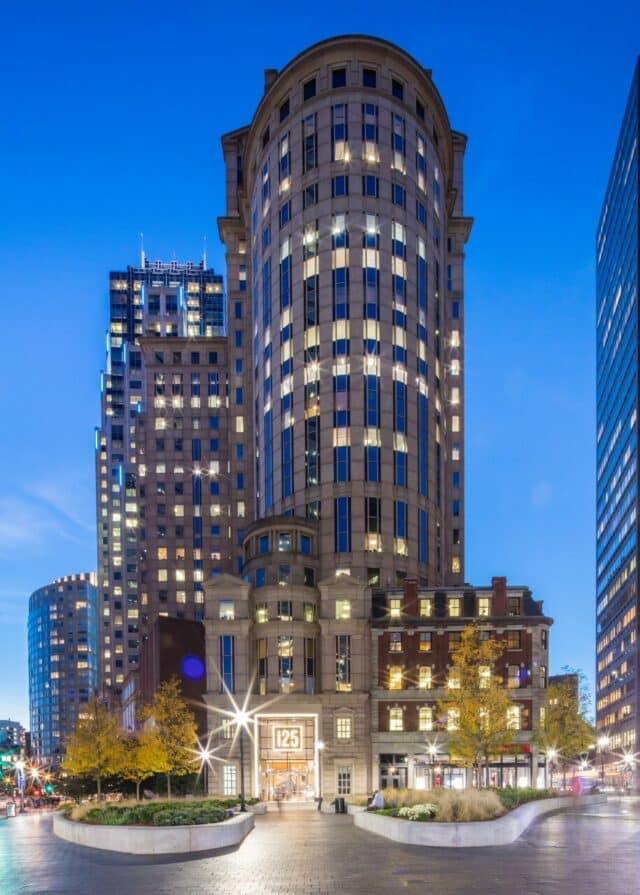
Last week, Fidelity Investments announced it plans to put its entire 803,000-square-foot headquarters next to South Station up for lease. iStock illustration
Greater Boston’s office market was showing signs of momentum before a financial services standard bearer provided a stark reminder about the new normal in workspace demand.
Fidelity Investments’ decision to offer its 803,000 square-foot headquarters at 245 Summer St. for sublease drops another big block of space on a market that was starting to find some footings, with three consecutive quarters of declining vacancy.
The Summer Street property could join the ranks of a category of previous-generation office buildings unable to compete against new trophy buildings that still have substantial availabilities.
“Those are the real problem children of the office market,” said Jennifer Schultz, a partner at law firm Nixon Peabody, referring to Boston’s office towers built between 1970 and 2015. “They are the class A buildings of yesterday that are simply not going to be able to make their way back.”
Fidelity had not previously indicated its plans for the Summer Street headquarters, as it nears completion of its Commonwealth Pier offices’ expansion and renovations. The Seaport District project was planned before the pandemic, and construction has been under way since fall 2020.
Tenants Create Leverage, Renew in Place
The financial services giant’s decision to vacate the Summer Street property by early 2027 reflects the continuing trend of consolidation among tenants. Although Fidelity has owned the property since 2020, many recent tenant decisions are driven by lease expirations, said Peter Evans, managing principal at brokerage Hunneman in Boston.
While some large tenants have relocated to smaller spaces in higher-end buildings, now many companies are renewing leases after negotiating more favorable deals with existing landlords, Evans said.
“They are going out and testing the market and trying to create leverage for themselves, so they can renew,” he said.
Law firm Ropes & Gray cast a wide net looking for a new headquarters before opting to renew with landlord BXP at the Prudential Tower, Evans noted.
Declines for Both Rents, Availabilities
Brokerage research released last week showed some positive indicators for the Greater Boston office market.
Boston’s availability rate declined 0.5 percent to 22.7 percent, including an 18.1 percent direct vacancy rate, Avison Young reported.
Back Bay maintained its status as the highest-rent submarket, with average annual direct asking rents of $78.12 per square foot. The neighborhood’s mixed-use building inventory has helped it maintain its vibrancy as office work shifted to hybrid, said John Dolan, Avison Young’s managing director in Boston.
“Back Bay has the Boston-esque history, and all of the class A properties can charge high rents. All of the companies that are established in Back Bay are not moving to the Financial District,” Dolan said.

Big expansions by tech companies have been rare in recent years as IPO activity and venture capital awards declined. In the biggest office lease of 2024, Klaviyo renewed and expanded to 256,000 square feet at 125 Summer St. in Boston. Photo courtesy of Oxford Properties
Greater Boston’s office vacancy rate has dropped for three straight quarters, JLL reported, ending the first quarter at 22.5 percent. Rents are dropping in both the downtown and suburban markets, however, placing additional stress on landlords’ finances.
The largest recent lease transaction was tech company Klaviyo’s renewal and expansion for 256,000 square feet at Oxford Properties’ 125 Summer St.. Klaviyo went public last fall in an initial public offering that raised $576 million.
It’s the sort of robust growth that tech companies had provided in the market prior to 2020, noted Matt Daniels, JLL’s New England brokerage lead.
But IPO activity and venture capital investment in the tech sector, as in life science, has declined sharply in the higher interest rate environment.
“Tech is not a huge driver, and that is Boston’s challenge right now. Where is the next LogMeIn, the homegrown companies that expand and stay here?” Daniels said.
‘Year of Reckoning’ Seen Approaching
Landlords of older office towers can’t compete with “A-plus trophy” buildings nearing completion such as South Station Tower and 10 World Trade which have substantial availabilities, Hunneman’s Evans said.
The results could be a wave of distress-driven transactions, as lenders decide to cut their losses on underperforming properties. The first shoe to drop was 1 Lincoln St., sold to its lender for $400 million after receiving a $1 billion refinancing package in only September 2022.

Steve Adams
Falling tower values are starting to reverberate across the city, too. Last week Boston Mayor Michelle Wu filed an annual budget proposal with city councilors that features the smallest year-over-year increase of her administration. The budget document notes office and lab vacancies are constraining growth in property taxes, the city’s main source of revenue.
“There is real distress in 2025, and 2026 is likely going to be a time of reckoning in the market,” Nixon Peabody’s Schultz said. “Everybody has been talking about ‘extend and pretend,’ and a lot of lenders were giving those extensions for a hefty paydown price, not on good terms for the office owners.”
Office landlords had hoped that the market might rebound significantly by the time their loans mature, but the post-pandemic decline in demand for office space appears to be permanent.
“There are classes of offices that can retain and attract tenants, and there are classes that cannot,” Schulz said.






